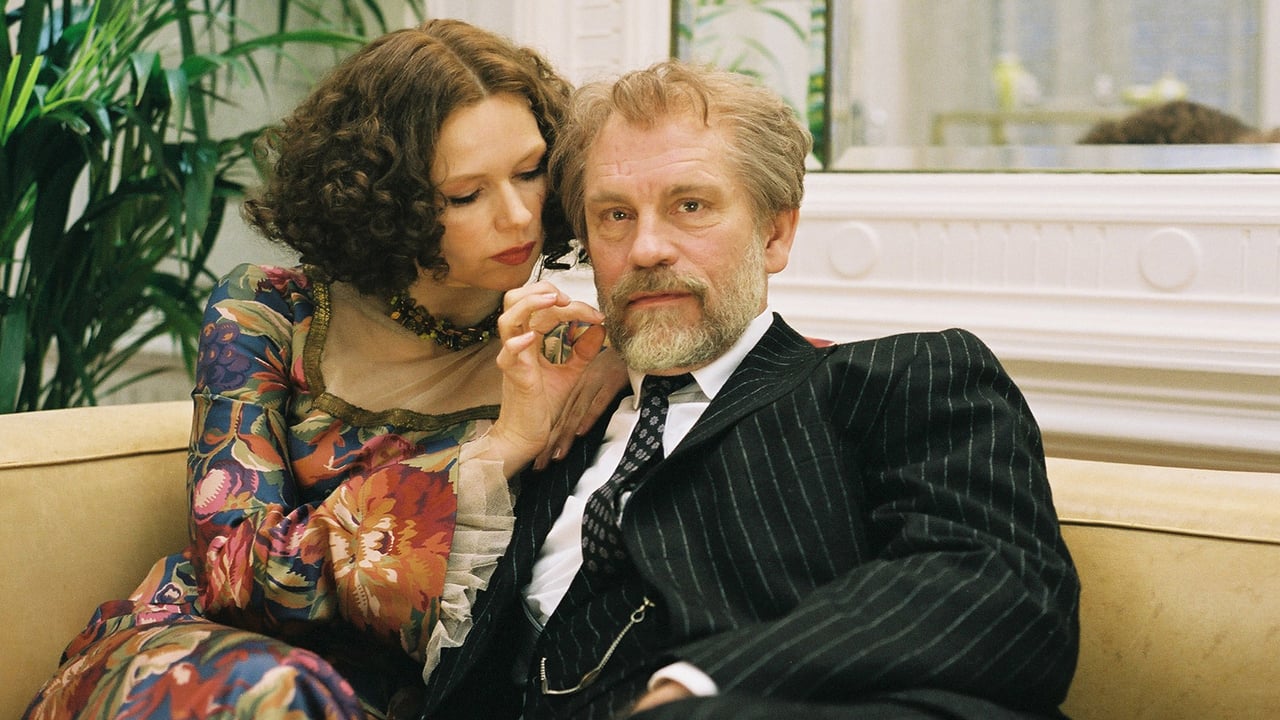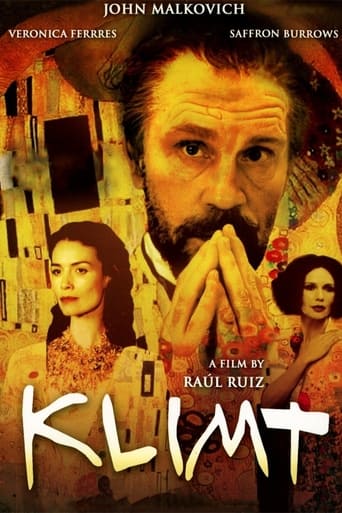



It's funny watching the elements come together in this complicated scam. On one hand, the set-up isn't quite as complex as it seems, but there's an easy sense of fun in every exchange.
View MoreWorth seeing just to witness how winsome it is.
The joyful confection is coated in a sparkly gloss, bright enough to gleam from the darkest, most cynical corners.
View More.Like the great film, it's made with a great deal of visible affection both in front of and behind the camera.
View MoreKLIMT:A Viennese Fantasy à la manière de Schnitzler is a controversial film, a montage of the elements of the art world and the sociopsychological tenor of the times of the infamous fin de siècle in Europe, a period greatly influenced by the writings of Sigmund Freud, thee novels and 'performances' of Arthur Schnitzler that focused on the emergence of the new views of sexuality. Being about the rise of sensualism in art and the subsequent Jugenstil (Art Nouveau) and Vienna Secessionist movement, writer director Raúl Ruiz (with aid from Herbert Vesely and Gilbert Adair) has painted a larger than life canvas of this fascinating period in art and in history in general and happens to populate it with significant character from the period. No, the film is not based on hard facts and yes, there are inconsistencies throughout. But that is of less importance than the allure of the period that very successfully comes through this film using the magic of light and the fluidity of the camera. Gustav Klimt (1862 - 1918) was a strange artist, a man who believed in a sensualist artificial religion and an artist who favored erotic imagery in his canvases. He was controversial in his time, yet today his paintings using gold leaf and silver leaf and design patterns of expression that defined Art Nouveau sell for many millions of dollars: his style is still imitated and he is still celebrated as the father of erotic art. The film opens and closes with Klimt (John Malkovich) submerged in healing waters in a rather stark hospital, attended by a nurse and his disciple, the equally sensational Egon Schiele (Nicolai Kinski, keeping his hands in the spread-finger style Schiele painted so often!). From this point bits and pieces of Klimt's bizarre life are explored, at times explained through imaginary conversations with his secretary (Stephen Dillane). His marriage, his 'affair' - or is it simply a manifestation of the influence of a muse? - with Lea de Castro (Saffron Burrows), his self indulgence in all things erotic (he is said to have has many affairs with Viennese women yielding a large number of children who bear his genetic puzzle), and his conflict with the Academy of Art, a sense of disgust with the current oeuvre of painting as sterile, and his prodigious output of paintings and drawing of the female nude - all are depicted with tremendous imagination here. The cinematography is as strange as the story it captures, using falling snowflakes in one scene to suggest the falling pieces of Klimt's gold leaf enhancement of his most famous works in others. The dialogue is at times raw and at other times superficial and the audience is begged to indulge in the fantasy that is being recreated. But the film stands well as an example of an art history period and John Malkovich makes a credible Klimt. This is more a film for art students and art lovers who are eager to explore the beginnings of Art Nouveau than a film for audiences eager for accurate biography. Grady Harp
View MoreJudging from the reviews here you either love this movie or you absolutely hate it. I for one loved it. Being from Austria myself, you often get confronted with Schiele and Klimt - especially in Vienna, to a point where you're basically sick of it. Because of that I never got to fully appreciate these two artists until much later. This movie did help me to appreciate the artwork more. I was able to see this movie at the premiere in Austria when it came out and haven't seen it since then (though I would like to) and I had to think about it many times since then. I can imagine that the reason many people didn't like this movie was because it's not what they expected. If you want to see a straight forward, biographical accurate movie about the life of Gustav Klimt, then this movie isn't for you. The basic premise is that Gustav Klimt is lying on his death bed and in a manner of flashbacks you get to see random scenes about a fictitious story revolving around a mysterious woman. Blinded by the fever, the scenes appear surreal and deliver a feeling similar to what you may feel upon viewing Klimt's artwork. There's no straight plot following this movie and the real Klimt may not have been the way he appears in the movie, but that was never intended anyway. What this movie does is brilliantly deliver an atmosphere very fitting to the Wiener Moderne. The very important "Kaffeehaus Kultur" at the time, where intellectuals of Vienna spent the entire day in coffee houses is portrayed very precisely as well. I also think that Malkovich and Nikolai Kinski seem to be a near perfect cast for Gustav Klimt and Egon Schiele. Anyway, if you've read this review and get the feeling that this movie is not for you, then don't watch it. But if you're intrigued by what you've read then by all means, go see this movie!
View Moreextraordinary filmshocked, initially, at the comments i found herecame to this film by serendipityknow nothing about Ruiz' other work -- now i want to see it allbeautiful beautiful beautiful -- writing and design and photography and musicshocked by its beauty and shocked by its reception -- tho i see there are only 34 comments here -- not primetime -- a gaggle of geese -- with sincere apologies to geese everywhere...rent it-- buy it -- a real piece of work
View MoreI had the chance to see this long awaited movie on cable TV and I thought it would be interesting when I realized it was directed by Chilean-french art film director Raul Ruiz. Nevertheless it turned out to be a complete bore, absurdly pretentious and wrongly rupturist, perhaps taking too much for granted on Ruiz well-known abstract cinematic style and nothing to provide information on this very influential and important painter. John Malkovich repeats himself on a role that doesn't demand for any psychological progression due to a self indulgent non linear narrative that fails completely in attempting to portray the tormented life of the Austrian artist. Ruiz's style to film might be interesting for another kind of movies in which you don't need to illustrate facts of life or narrate biographic events. In this film he seems to be an accurate expert on the European description of intellectuals and artists belonging to the 20th century, but still he cannot give a coherent description of Gustav Klimt's eccentric life.
View More